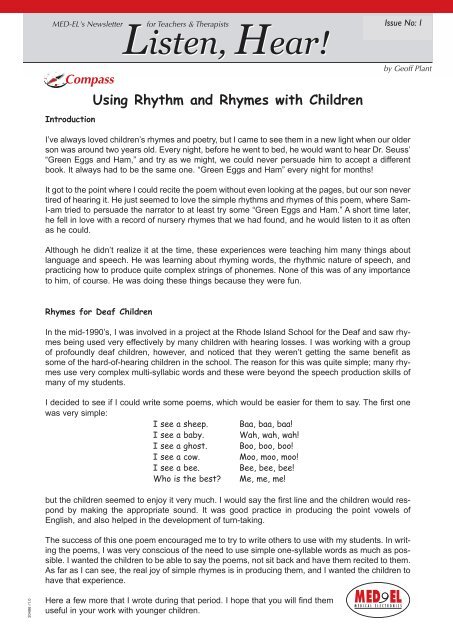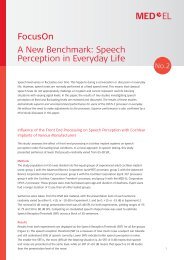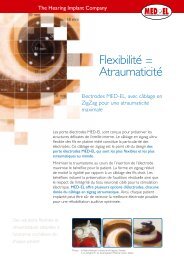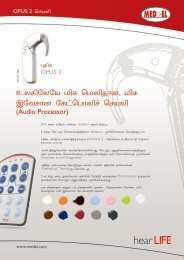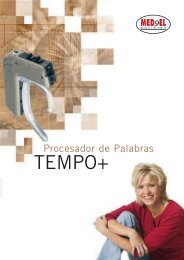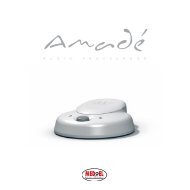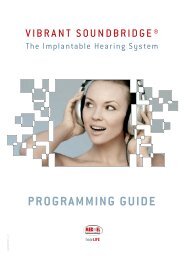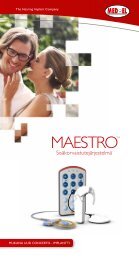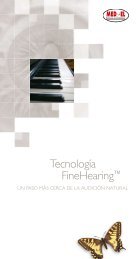Using Rhythm and Rhymes with Children - Med-El
Using Rhythm and Rhymes with Children - Med-El
Using Rhythm and Rhymes with Children - Med-El
Create successful ePaper yourself
Turn your PDF publications into a flip-book with our unique Google optimized e-Paper software.
20486 r1.0<br />
Introduction<br />
<strong>Using</strong> <strong>Rhythm</strong> <strong>and</strong> <strong>Rhymes</strong> <strong>with</strong> <strong>Children</strong><br />
I’ve always loved children’s rhymes <strong>and</strong> poetry, but I came to see them in a new light when our older<br />
son was around two years old. Every night, before he went to bed, he would want to hear Dr. Seuss’<br />
“Green Eggs <strong>and</strong> Ham,” <strong>and</strong> try as we might, we could never persuade him to accept a different<br />
book. It always had to be the same one. “Green Eggs <strong>and</strong> Ham” every night for months!<br />
It got to the point where I could recite the poem <strong>with</strong>out even looking at the pages, but our son never<br />
tired of hearing it. He just seemed to love the simple rhythms <strong>and</strong> rhymes of this poem, where Sam-<br />
I-am tried to persuade the narrator to at least try some “Green Eggs <strong>and</strong> Ham.” A short time later,<br />
he fell in love <strong>with</strong> a record of nursery rhymes that we had found, <strong>and</strong> he would listen to it as often<br />
as he could.<br />
Although he didn’t realize it at the time, these experiences were teaching him many things about<br />
language <strong>and</strong> speech. He was learning about rhyming words, the rhythmic nature of speech, <strong>and</strong><br />
practicing how to produce quite complex strings of phonemes. None of this was of any importance<br />
to him, of course. He was doing these things because they were fun.<br />
<strong>Rhymes</strong> for Deaf <strong>Children</strong><br />
In the mid-1990’s, I was involved in a project at the Rhode Isl<strong>and</strong> School for the Deaf <strong>and</strong> saw rhymes<br />
being used very effectively by many children <strong>with</strong> hearing losses. I was working <strong>with</strong> a group<br />
of profoundly deaf children, however, <strong>and</strong> noticed that they weren’t getting the same benefit as<br />
some of the hard-of-hearing children in the school. The reason for this was quite simple; many rhymes<br />
use very complex multi-syllabic words <strong>and</strong> these were beyond the speech production skills of<br />
many of my students.<br />
I decided to see if I could write some poems, which would be easier for them to say. The first one<br />
was very simple:<br />
I see a sheep. Baa, baa, baa!<br />
I see a baby. Wah, wah, wah!<br />
I see a ghost. Boo, boo, boo!<br />
I see a cow. Moo, moo, moo!<br />
I see a bee. Bee, bee, bee!<br />
Who is the best? Me, me, me!<br />
but the children seemed to enjoy it very much. I would say the first line <strong>and</strong> the children would respond<br />
by making the appropriate sound. It was good practice in producing the point vowels of<br />
English, <strong>and</strong> also helped in the development of turn-taking.<br />
The success of this one poem encouraged me to try to write others to use <strong>with</strong> my students. In writing<br />
the poems, I was very conscious of the need to use simple one-syllable words as much as possible.<br />
I wanted the children to be able to say the poems, not sit back <strong>and</strong> have them recited to them.<br />
As far as I can see, the real joy of simple rhymes is in producing them, <strong>and</strong> I wanted the children to<br />
have that experience.<br />
Here a few more that I wrote during that period. I hope that you will find them<br />
useful in your work <strong>with</strong> younger children.<br />
Issue No: 1
Bad, bad bee<br />
One, two, three. I saw a bee.<br />
One, two, three. The bee saw me.<br />
Wah, wah, wah! The bee bit me!<br />
Wah, wah, wah! Bad, bad, bee!<br />
Wah, wah, wah! Why bite me?<br />
____________________<br />
In my house<br />
In my house. I saw a mouse.<br />
The mouse was bad. He bit my Dad!<br />
I was sad. He bit my Dad!<br />
I don’t like mice. They are not nice.<br />
Most of these rhymes allow for the teacher <strong>and</strong> child to take turns in producing alternate lines. This<br />
is especially important in the early stages of speech production, when the child's speech production<br />
skills may limit her/his participation to repetition of counting patterns or simple syllables. As the<br />
child’s skills improve, however, s/he can produce the poem in its entirety.<br />
<strong>Rhymes</strong> <strong>with</strong> Older <strong>Children</strong><br />
____________________<br />
In a tree<br />
One, two, three<br />
One, two, three One two, three<br />
Me <strong>and</strong> you. You <strong>and</strong> me.<br />
One <strong>and</strong> two. One <strong>and</strong> two.<br />
You <strong>and</strong> me. Me <strong>and</strong> you.<br />
____________________<br />
I know more<br />
One, two. I know you.<br />
Two, three. You know me.<br />
Three four. I know more.<br />
I know more. I know more.<br />
You know me, but I know more!<br />
In a tree. In a tree. In a tree, I see a bee<br />
In a boat. In a boat. In a boat, I see a goat.<br />
On a mat. On a mat. On a mat, I see a cat.<br />
On a dish. On a dish. On a dish, I see a fish.<br />
I’ve also used many of my rhymes <strong>with</strong> older children <strong>and</strong> have been very pleased by how much<br />
they seem to enjoy this activity. I remember working <strong>with</strong> one group of 10 – 12 year old hard-of-hearing<br />
children, <strong>and</strong> introducing them to “I know more” <strong>and</strong> being surprised by how they produced it.<br />
Once they had learned the words, one of the children asked if they could beat out a rhythm while<br />
they were saying it. I agreed, <strong>and</strong> was surprised when they started to produce exactly the same rhythm<br />
as used by the rock group Queen, in their hit “We will rock you.” It worked very well, <strong>and</strong> encouraged<br />
older children to use a poem which they might have rejected in other circumstances.<br />
Although this particular poem was a success, I knew that I would have to produce more complex<br />
ones if I wanted to retain the children’s interest. I decided that poems might also serve as a way to<br />
teach some of the more complex rules of English. The first one I attempted introduced some of the<br />
irregular past tenses of verbs. These “rule-breakers” create special problems for many deaf children,<br />
<strong>and</strong> I wanted a way in which forms such as “send/sent,” “sell/sold,” “run/ran,” etc., could be<br />
introduced. The poem on the next page, “Now <strong>and</strong> Before,” was the result. Try saying using a simple<br />
“rap” rhythm <strong>and</strong> see what you think.<br />
The final poem “Summer Friends” is on the last page of this newsletter. It’s relatively simple, but I’ve<br />
found it suitable for use <strong>with</strong> older children. I’ve written a number of other poems which can be used<br />
<strong>with</strong> this age group, <strong>and</strong> encourage teachers <strong>and</strong> therapists to try to do the same. I’m sure that you’ll<br />
gain a great deal of satisfaction from hearing children using your poems to improve their speech.
Now <strong>and</strong> Before<br />
Now I know, but before I knew.<br />
Now I throw, but before I threw.<br />
Now I feel, but before I felt.<br />
Now I kneel, but before I knelt.<br />
KNOW KNEW THROW THREW<br />
FEEL FELT KNEEL KNELT<br />
Now I think, but before I thought.<br />
Now I fight, but before I fought.<br />
Now I grow, but before I grew.<br />
Now I fly, but before I flew.<br />
THINK THOUGHT FIGHT FOUGHT<br />
GROW GREW FLY FLEW<br />
Now I buy, but before I bought.<br />
Now I bring, but before I brought.<br />
Now I see, but before I saw.<br />
Do you want to hear some more?<br />
You do? You do? Well, that’s just great!<br />
Now I eat, but before I ate.<br />
Even more? I knew you would.<br />
Now I can, but before I could.<br />
Now I feed, but before I fed.<br />
Now I say, but before I said.<br />
Now I sell, but before I sold.<br />
Now I tell, but before I told.<br />
FEED FED SAY SAID<br />
SELL SOLD TELL TOLD<br />
Now I wear, but before I wore.<br />
Now I tear, but before I tore.<br />
Now I drive, but before I drove.<br />
Now I dive, but before I dove.<br />
WEAR WORE TEAR TORE<br />
DRIVE DROVE DIVE DOVE<br />
Contact<br />
Now I light, but before I lit.<br />
Now I bite, but before I bit.<br />
Now I go, but before I went.<br />
Now I send, but before I sent.<br />
LIGHT LIT BITE BIT<br />
GO WENT SEND SENT<br />
Now I find, but before I found.<br />
Now I grind, but before I ground.<br />
Now I flee, but before I fled.<br />
Now I bleed, but before I bled.<br />
FIND FOUND GRIND GROUND<br />
FLEE FLED BLEED BLED<br />
Now you see it’s just a game.<br />
Now I come, but before I came.<br />
There’s even more, there’s more to tell.<br />
Now I fall, but before I fell.<br />
Now I bite, but before I bit.<br />
Have you had enough? Do you want to quit?<br />
You don’t? You don’t? You’re quite a kid!<br />
Now I do, but before I did.<br />
I’ve had enough. How about you?<br />
Now I draw, but before I drew.<br />
I said enough! It’s time to close.<br />
Now I choose, but before I chose.<br />
Please let me go! Let me off the hook!<br />
Now I take, but before I took.<br />
Please let me go. I’m really done.<br />
Now I win, but before I won.<br />
I know! Here’s one doesn’t change a bit.<br />
Now I hit, but before I hit!<br />
We’re at the end. It’s time to say.<br />
Good-bye, until another day.<br />
This is the first issue of “Listen, Hear,” <strong>and</strong> I hope that we’ll have another one out soon. If you have<br />
any comments, feedback, or suggestions for future issues, please contact me at:<br />
Post: Geoff Plant email: hearf@aol.com<br />
MED-EL<br />
35 <strong>Med</strong>ford Street<br />
Somerville, MA 02143<br />
I look forward to hearing from you.
Summer Friends<br />
In a small town by the sea.<br />
I met you, <strong>and</strong> you met me.<br />
I was five <strong>and</strong> you were three.<br />
In that small town by the sea.<br />
Summer friends we'd always be,<br />
In that small town by the sea.<br />
In Mom's boat we'd sometimes sail.<br />
Once we even saw a whale.<br />
Spouting water, swimming free.<br />
Near that small town by the sea.<br />
Every summer we'd have fun.<br />
Swimming, running in the sun.<br />
Happy as we'd ever be,<br />
In that small town by the sea.<br />
When summer ended, home we'd go.<br />
Fall <strong>and</strong> winter went so slow.<br />
But spring meant that soon we'd be<br />
In that small town by the sea.<br />
Summer friends, just you <strong>and</strong> me.<br />
In that small town by the sea.


